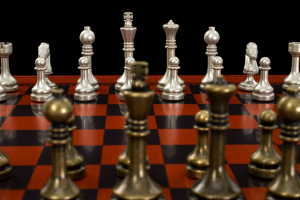 I don’t think it’s easy for us to understand the barrier that existed between Jew and Gentile in the first century. Not so much in terms of social interaction (although that definitely existed), but especially in terms of religion. It would have been extremely difficult for a Jew to look on a Gentile as an equal, spiritually speaking. This was still true even in the early church.
I don’t think it’s easy for us to understand the barrier that existed between Jew and Gentile in the first century. Not so much in terms of social interaction (although that definitely existed), but especially in terms of religion. It would have been extremely difficult for a Jew to look on a Gentile as an equal, spiritually speaking. This was still true even in the early church.
Because of this, it was a stunning message that Paul and others preached, a message of equality in the gospel: “For he himself is our peace, who has made the two one and has destroyed the barrier, the dividing wall of hostility, by abolishing in his flesh the law with its commandments and regulations. His purpose was to create in himself one new man out of the two, thus making peace, and in this one body to reconcile both of them to God through the cross, by which he put to death their hostility. He came and preached peace to you who were far away and peace to those who were near. For through him we both have access to the Father by one Spirit.” (Ephesians 2:14-18) Christ had torn down the wall of division. He had brought Jew and Gentile into one body.
To Paul, this was one of the great truths of Christianity, a mystery that God had kept hidden in the past: “This mystery is that through the gospel the Gentiles are heirs together with Israel, members together of one body, and sharers together in the promise in Christ Jesus.” (Ephesians 3:6)
At the heart of all of this was the church, God’s masterpiece which he had to show off to all creation: “Although I am less than the least of all God’s people, this grace was given me: to preach to the Gentiles the unsearchable riches of Christ, and to make plain to everyone the administration of this mystery, which for ages past was kept hidden in God, who created all things. His intent was that now, through the church, the manifold wisdom of God should be made known to the rulers and authorities in the heavenly realms, according to his eternal purpose which he accomplished in Christ Jesus our Lord.” (Ephesians 3:8-11)
The rulers and authorities which would divide people, placing them in rival clans, tribes and nations, these powers would be shown God’s power to reconcile, to bring people together. Where is that power seen? In that church. Because of this, the Lord’s church must be an agent of reconciliation, a force for bringing all people together, regardless of nationality, language, race or other human division.
Tribalism is an enemy of the church, a tool of the powers and authorities that set themselves up against God’s authority. God’s truth is that all men are made in his image and all men can be brought into the body of Christ, the holy Christian nation. “There is neither Jew nor Greek, slave nor free, male nor female, for you are all one in Christ Jesus. If you belong to Christ, then you are Abraham’s seed, and heirs according to the promise.” (Galatians 3:28-29)
Because of this, Christians must work at bringing people together. We must learn to ignore nationalities and other aspects of tribalism that would separate us from others. We have to come to an awareness of the length, depth, width and height of our kingdom, spanning borders, time zones and continents. The church is God’s answer to man’s tribalism.
Like this:
Like Loading...
“In the year that King Uzziah died, I saw the Lord, high and exalted, seated on a throne” Isaiah 6:1


